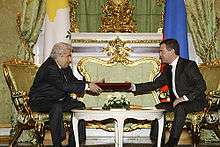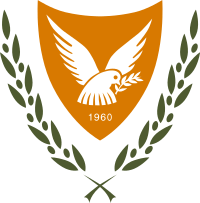Demetris Christofias
| Demetris Christofias | |
|---|---|
| Δημήτρης Χριστόφιας | |
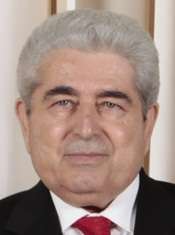 | |
| 6th President of Cyprus | |
|
In office 28 February 2008 – 28 February 2013 | |
| Preceded by | Tassos Papadopoulos |
| Succeeded by | Nicos Anastasiades |
| 9th President of the House of Representatives | |
|
In office 7 June 2001 – 28 February 2008 | |
| Preceded by | Spyros Kyprianou |
| Succeeded by | Marios Garoyian |
| General Secretary of the Progressive Party of Working People | |
|
In office 22 April 1988 – 21 February 2009 | |
| Preceded by | Ezekias Papaioannou |
| Succeeded by | Andros Kyprianou |
| Personal details | |
| Born |
29 August 1946 Dikomo, Cyprus |
| Political party | Progressive Party of Working People |
| Spouse(s) | Elsie Chiratou |
| Children |
Marianna Christina Christos |
| Alma mater | Russian Academy of Sciences |
| Signature |
 |
Demetris Christofias, also spelled Dimitris Christofias (Greek: Δημήτρης Χριστόφιας [ðiˈmitɾis xɾiˈstofças]; born 29 August 1946), is a Greek Cypriot former politician who was the sixth President of Cyprus from 2008 to 2013. Christofias was the General Secretary of AKEL, the Communist Party of Cyprus, and was the European Union's and Cyprus' first, and so far only, Communist head of state. He won the 2008 Cypriot presidential elections in the second round of voting. Throughout the election campaign, he pledged to restart talks with Turkish Cypriots in order to find a solution to the Cyprus dispute and reunify the island. He has also supported the closure of the British military bases on Cyprus.[1]
Biography
Demetris Christofias was born in Dhikomo in the Kyrenia District of Cyprus, in the area that has been under military occupation by Turkey since 1974.[2] He received his secondary-school education at Nicosia Commercial Lyceum, from which he graduated in 1964. At the age of 14, he joined the progressive secondary-school students organisation, PEOM, and at the age of 18, he joined EDON (AKEL's United Democratic Youth Organisation), PEO Trade Unions, and AKEL. In 1969, at the 5th Congress of EDON, he was elected member of the Central Council.
Christofias spent five years in Moscow in the Soviet Union where he studied at the Institute of Social Sciences, Academy of Social Sciences, from which he received a degree in history. He speaks Russian and English. In Moscow he met his wife, Elsie Chiratou, and later returned to Cyprus and political life. Dimitris Christofias married Elsie (Chiratou) Christofias in 1972 and they have three children—two daughters, Marianna and Christina, and a son, Christos.[3] He is allegedly an Atheist.[4][5]
Career
Public figure
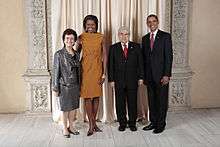
In 1974 Christofias was elected to the post of the Central Organising Secretary of EDON and in 1977 to the post of General Secretary. He served in the latter post until 1987. In 1976 he was elected as a member of the Nicosia-Kyrenia District Committee of AKEL, and in 1982 – at the 15th Congress of AKEL – he was elected as a member of the Central Committee of the Party.
In July 1986 Christofias was elected as an alternate member of the Political Bureau of AKEL. After the 16th Congress of AKEL, held in November 1986, he was elected as a full member of the Political Bureau, and in 1987 (after terminating his service as General Secretary of EDON) he was elected as a member of the AKEL Secretariat. In April 1988, following the death of Ezekias Papaioannou, he was elected as General Secretary of AKEL, a post he held until 2009.
Rise to local leadership
Christofias was elected as a Member of the House of Representatives for the first time in 1991 and was re-elected in the subsequent parliamentary elections of 1996 and 2001. On 7 June 2001, he was elected as President of the House of Representatives. He was re-elected as President of the House of Representatives in 2006. In his function as General Secretary of AKEL and President of the House of Representatives, he was a Member of the National Council, a supreme advisory body to the President of the Republic.
Christofias was ex-officio chairman of the House Standing Committee on Selection and chairman of the ad hoc House Standing Committee on Rules of Procedure and of the Special House Standing Committee on Declaration and Examination of Property. He was also president of the executive committees of the Cyprus group to the Inter-Parliamentary Union and of the Cyprus branch of the Commonwealth Parliamentary Association.
2008 presidential election
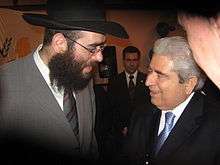
The first round of the February 2008 presidential election, held on 17 February, saw a close result between the three leading candidates—Christofias, Ioannis Kasoulides of DISY, and the incumbent Tassos Papadopoulos—Christofias narrowly placing second with 33.3% of the vote, behind Kasoulidis with 33.5%. Christofias and Kasoulidis participated in a second round on February 24[6] for which Christofias received the backing of Papadopoulos's party, DIKO.[7] Christofias went on to win the election with 53.37% of the vote.[8] After his success he pledged to restart talks to find a solution to reunify the island. In addressing a jubilant crowd in the Cyprus capital Nicosia's streets the new president-elect said he looked forward to "substantial cooperation for the benefit of both communities".[9] "Tomorrow, a new day begins. We will see many difficulties ahead of us. As of tomorrow, we unite our forces...to achieve the reunification of our country".[10]
Christofias was sworn in as President at a ceremony in the House of Representatives on 28 February 2008, vowing that "the solution of the Cyprus problem will be the top priority of my government".[11] Although proud to be a communist, he said he would leave the free market economy alone.[12] While much of the focus beyond Cyprus was on Christofias's communist background and education in Moscow, on the island voters were more concerned with a solution to Europe's longest running conflict—the island's partition since 1974.[13]
Government
.jpg)
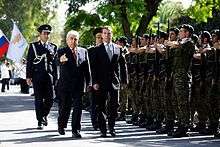
On February 29, 2008, Christofias proceeded to appoint his government. Christofias' first government was a coalition between his own party AKEL, Marios Garoyian's Democratic Party and Yiannakis Omirou's Movement for Social Democracy. Christofias started talks with Mehmet Ali Talat on the reunification of Cyprus as a bizonal federal state,[14] but his hopes for Greek Cypriot approval of such a plan were soon scotched by the nationalists' victory in Northern Cyprus' 2009 parliamentary elections.[14]
On July 28, 2011, Cyprus's cabinet tendered its resignation bowing to political and public pressure after a massive munitions blast at Evangelos Florakis Naval Base on July 11 2011 threatened to force the island into asking for an EU bailout. Apparently he was not aware that the power plant was next to the naval base, even though he drove past it each time to go to his village where he had his first job as a barista. President Christofias asked the people of Cyprus in his speech not to re-live episodes of the 1974 invasion, as crowds of citizens demanded his resignation over his alleged involvement in the blast. Both EDEK and DIKO had withdrawn their support for Christofias by the beginning of August 2011.
On 3 October 2011, the results of the investigation regarding the Evangelos Florakis Naval Base explosion were released to the public, placing the blame for the incident mainly on President Christofias, holding him “personally and institutionally responsible” for the blast.[15][16] Christofias rejected the results of the investigation and denied any personal responsibility for the tragedy.[17]
On 9 October 2011, the police report, "prepared by head of CID at police HQ", recommended the prosecution of 12 people; the police rejected claims they were trying to protect the Presidential palace officials with their report, instead asserting that the "police perform their duties “impartially and objectively”". The police also report that they "carefully avoided saying who and how many we propose to take to court, because the final word on who will be brought to justice rests with the AG...in no way did we want to stigmatise someone who the AG may later judge there is insufficient evidence to prosecute”.[18]
The country's banking crisis that came to a head in 2012 was blamed on Christofias, his lack of ability, and his refusal to take advice from his ministers. In polls conducted shortly before the expiration of his presidential term, he was voted as the worst president to have held office since the foundation of the Cypriot Republic.[19][20] Cyprus, a euro area country, asked for financial bailout in June 2012, but talks faltered when President Christofias balked at measures such as privatization.[21]
On 14 May 2012, Christofias announced he would not seek re-election for a second term in the next year, citing a deadlock in talks on the island's reunification.[22] He left office on 28 February 2013, following the presidential elections he did not take part in.
References
- ↑ "Cyprus elects its first communist president", The Guardian, 25 February 2008.
- ↑ Christofias Demetris. Curriculum Vitae. presidency.gov.cy
- ↑ Michele Kambas (February 24, 2008). "FACTBOX — Five facts about Cyprus leftist Christofias". Reuters.
- ↑ "For instance, Chrysostomos might argue that certain self-declared atheists should not be allowed to vote. It's worth recalling that a couple of years ago, the leader of the communist party AKEL Demetris Christofias said he was an atheist." Elias Hazou, 'Church elections: how it works', Cyprus Mail archive article, September 17, 2006 (accessed May 15, 2008).
- ↑ "Most of the campaign has focused on Christofias's credentials. His detractors have portrayed him as a die-hard communist who spurns his ethnic roots and has an allegedly atheist background." News Editor, Greek Cypriots elect new president, bdnews24.com archive article, February 24, 2008 (accessed July 26, 2014).
- ↑ "Incumbent eliminated from Cyprus presidential election in major surprise", Associated Press (International Herald Tribune), 17 February 2008.
- ↑ "Communist chief gains edge in Cyprus poll" at the Wayback Machine (archived January 16, 2009), AFP (news.com.au), 21 February 2008.
- ↑ "Presidential Election 2008: Run-off Election: Official results". Cypriot government. 2008-02-24. Archived from the original on November 2, 2007. Retrieved 2008-02-24.
- ↑ "Christofias wins Cyprus presidency". CNN. 2008-02-24. Archived from the original on 2008-02-29. Retrieved 2008-02-25.
- ↑ USA Today "Christofias wins Cyprus presidential election" 25 February 2008. Usatoday.com (2008-02-24). Retrieved on 2011-12-17.
- ↑ "New Cyprus president takes office with pledge for solution", Xinhua, February 28, 2008.
- ↑ Kambas, Michele. (2008-02-24) "Communist Christofias wins Cyprus presidential vote", Reuters. Retrieved on 2011-12-17.
- ↑ Birch, Nicholas, "Leftist victory revives hopes for a united Cyprus", The Independent, 25 February 2008. Retrieved on 2011-12-17.
- 1 2 "Cyprus country profile". BBC News. 27 May 2011. Archived from the original on 28 July 2011.
- ↑ Kambas, Michele (3 October 2011). "Independent probe blames Cyprus leader for blast". Reuters.
- ↑ Mari probe: President is blamed for blast. Cyprus Mail (2011-10-04). Retrieved on 2011-12-17.
- ↑ "Cyprus president denies blame for munitions blast". Reuters. 3 October 2011.
- ↑ Outcry as ‘leaked report’ puts some blast responsibility on the dead. Cyprus Mail (2011-10-09). Retrieved on 2011-12-17.
- ↑ President Demetris Christofias has brought Cyprus to this sorry state. The Gurdian (2012-19-12). Retrieved on 2013-18-03.
- ↑ Conservative Is Elected President in Cyprus The New York Times, February 24, 2013.
- ↑ After Negotiations, Cyprus Agrees to a Euro Zone Bailout PackageThe New York Times, March 15, 2013.
- ↑ Cyprus leader won't run for 2nd term
External links
- Profile in House of Representatives web site at the Wayback Machine (archived June 14, 2008) (Greek)
| Party political offices | ||
|---|---|---|
| Preceded by Ezekias Papaioannou |
General Secretary of the Progressive Party of Working People 1988–2009 |
Succeeded by Andros Kyprianou |
| Political offices | ||
| Preceded by Spyros Kyprianou |
President of the House of Representatives 2001–2008 |
Succeeded by Marios Garoyian |
| Preceded by Tassos Papadopoulos |
President of Cyprus 2008–2013 |
Succeeded by Nicos Anastasiades |
